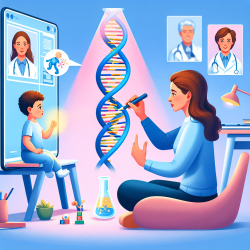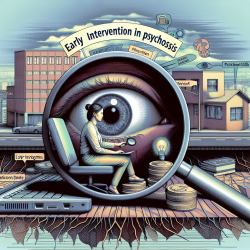Introduction
In the realm of speech-language pathology, understanding the genetic underpinnings of developmental disorders is crucial for tailoring effective interventions. A recent study, "Recurrent reciprocal deletions and duplications of 16p13.11," sheds light on the genetic factors contributing to mental retardation and multiple congenital anomalies (MR/MCA). This research provides invaluable insights that can enhance our approach to therapy, particularly in children who may present with these genetic variations.
Understanding the Research
The study conducted a comprehensive analysis of 1027 patients, identifying deletions and duplications in the 16p13.11 region. Notably, deletions in this region were significantly associated with MR/MCA, whereas duplications appeared to be benign variants. The absence of deletions in a control group of 2014 individuals underscores the deletion's potential role in developmental disorders.
Implications for Speech Therapy
For practitioners, these findings highlight the importance of genetic screening in understanding the root causes of speech and language delays. By identifying children with 16p13.11 deletions, therapists can better tailor interventions to address the specific challenges these children face, such as microcephaly and epilepsy, which were common in deletion carriers.
- Targeted Interventions: Understanding the genetic basis allows for more personalized therapy plans, focusing on specific deficits related to the genetic profile.
- Collaborative Care: Speech therapists can collaborate with geneticists and other healthcare providers to create a comprehensive care plan, ensuring all aspects of the child's development are addressed.
- Parental Guidance: Educating parents about the genetic factors influencing their child's development can empower them to make informed decisions about therapy and care.
Encouraging Further Research
While this study provides significant insights, it also opens the door for further research. Understanding the full spectrum of phenotypic expressions associated with 16p13.11 duplications, for instance, remains an area ripe for exploration. Practitioners are encouraged to stay abreast of ongoing research and consider participating in studies that further elucidate these genetic influences.
Conclusion
The findings from this research underscore the importance of genetic considerations in speech therapy. By integrating genetic insights into practice, therapists can enhance their ability to support children with developmental challenges, ultimately unlocking their full potential. For those interested in delving deeper into this study, the original research paper can be accessed here.










